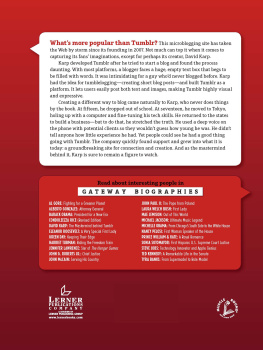The Mastermind Bible How to use a mastermind group to become successful
Steve Jeremy
Translated by Nicole Y. Adams
The Mastermind Bible How to use a mastermind group to become successful
Written By Steve Jeremy
Copyright 2017 Steve Jeremy
All rights reserved
Distributed by Babelcube, Inc.
www.babelcube.com
Translated by Nicole Y. Adams
Babelcube Books and Babelcube are trademarks of Babelcube Inc.
Contents
Legal notice
For many people today, professional and personal progress is one of the most important aspects of their lives. This progress, and the longed-for success, can be achieved in many ways and they are as diverse as the people who choose them. Many people, however, sooner or later come to the realisation that they cant always go it alone. Every now and then, we find ourselves in a situation that is hard to cope with. All of a sudden, the challenges ahead seem so complex that we freeze up and find it impossible to make decisions. We get stuck and need objective guidance from outside. Yet these circumstances are often so unusual, either professionally or personally speaking, that it is difficult to find suitable individuals with the required experience and the necessary understanding of the particular situation.
Sometimes, for a variety of reasons, we are just not comfortable asking our closest relatives or friends for help. Perhaps they lack insight into the matter, or it may be that our problems or questions concern these very relatives or friends. Naturally, when we run into difficulties or challenges, we will usually be most comfortable confiding in people close to us. Professional crises or worries, however, can also have an immediate impact on our personal life. After all, if we keep bringing our work home to our friends and relatives, day in and day out, it becomes increasingly difficult to be able to just relax and switch off once in a while. In the long run, this can put a significant strain on our personal relationships. In such cases, it makes sense to seek help from people who are in the same boat or who have had similar experiences in the past, and who might have a different view of things at any rate, people who are not directly involved with the situation at hand and who can therefore offer objective advice. The principle of mastermind groups is based on precisely this concept.
What does mastermind mean?
T he term mastermind typically designates a thought leader or genius with a master brain, so to speak. Mastermind can also refer to the driving force within a group of individuals, a creative mind and chief planner who inspires their group to deliver peak performance and takes them to the top of their game.
What is a mastermind group?
T he principle behind mastermind groups is based on precisely this driving force or creative genius. This union of people with the same intentions or similar personal or professional backgrounds is not, however, promoted and propelled to maximum performance level by a single person. Rather, all members of the group are the driving force in equal measure. This basic idea is the foundation of mastermind groups.
The concept of such a productive combination of different strengths, abilities and experiences was established at the beginning of the 19th century in a self-help book by the writer Napoleon Hill, Think and grow rich, in which the term mastermind is mentioned for the first time in this context. As he wrote his book, Hill conducted research among more than 500 successful self-made millionaires in order to investigate the secret of their success. At this time, creative minds, ingenious developers and wealthy businessmen were already meeting regularly in small, exclusive circles to promote each other professionally and personally, to encourage and support one another, and to drive their businesses and mutually benefit from a healthy network of useful contacts. At that time, developers like Henry Ford hired the best consultants and experts in the relevant specialist fields in order to benefit from their knowledge and experience in exchange for a fee. Today, people tend to come together on an equal footing. It is rare to focus exclusively on the success of a single person, supported by the other group members.
A prominent example of a historic mastermind group is The Vagabonds: between 1915 and 1924, this group around Henry Ford, Thomas Edison, the then US President Warren Harding and Harvey Firestone met regularly in the countryside with the aim of promoting each others careers. Another group that met regularly between 1930 and 1940 was The Inklings around J.R.R. Tolkien, C.S. Lewis, and the publisher of Oxford University Press. They met in a little caf to promote and support each other and to encourage one another to perform at their peak. In the process, they made contacts and established a network that would benefit them during the course of their careers.
It was men like these who were the object of Napoleon Hills research, and who willingly allowed him to explore and disclose the secrets of their success.
Following twenty years of research, Hill finally drafted a kind of universal recipe for personal and professional success in society. Hill focused on a number of key issues that were at the same time the objective of his mastermind methodology: personality development, professional and personal success, material prosperity, appreciation and reputation, and lasting fulfilment.
These were the goals pursued by the union of successful businessmen at that time, and Hill strived to make the possibility of achieving them accessible to a larger number of people.
How to picture a mastermind group
H ill presented the concept of mastermind groups to the public and found that the idea was immediately very well received. This method of self-optimisation established itself and is still popular today. It is applied in many areas of life by many people, both personally and professionally.
You have surely experienced this situation at some stage: at a gathering of friends or family, you start to discuss a relevant topic that has been on your mind for some time. Thoughts are expressed, diverse viewpoints emerge and different experiences come together, and all of a sudden you find yourself coming up with ideas and thoughts that you would never have had prior to this discussion, and that completely change or expand your view. Hill writes: Working together in groups creates another, invisible force. Today, we would call this the positive effect of group work or successful team work!
Next page
















